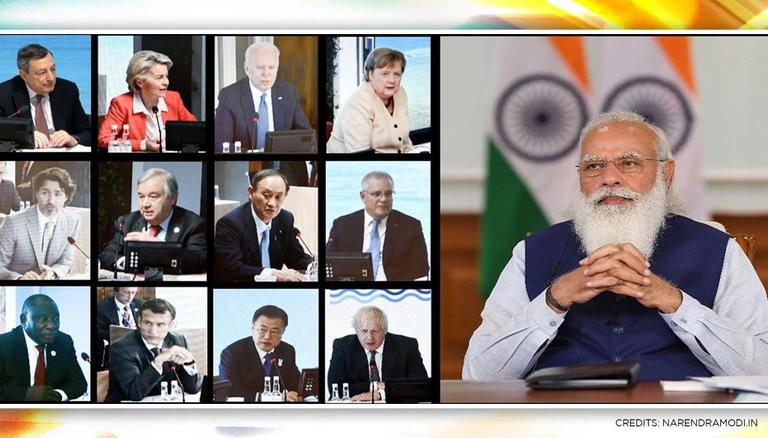
G-7 Intimidating China
Recently, the G-7 Summit was held in the city of Cornwall, UK. The G-7 countries include USA, UK, Canada, Germany, Italy, France and Japan. In addition, its conferences are attended by the President of the European Commission and the President of the European Council as representatives of the European Union being permanent invitees. This year's host UK’s Prime Minister Boris Johnson also invited four countries - India, Australia, South Korea and South Africa to the summit. In all representatives of 11 countries and the European Union attended the G-7 Summit this year. It is notable that China was never included in G-7 as member, nor was it ever invited.
People say that the Three Cs dominated this conference, namely, Corona, Climate and China. Although many topics were discussed in this conference, but most of the discussion can be said to have anti-China tone. Many examples of anti-China voices could be found in this conference. Prime Minister Narendra Modi emphasized the role of ‘democratic and transparent nations’ in dealing with the corona pandemic, which simply means that we do not expect anything from China regarding the solution to Corona, because China is neither democratic nor transparent. Not only this, emphasis was also laid on intensifying efforts to investigate the origin of corona pandemic in the conference.
Not only this, a top official of the US’s Biden administration stressed the need to respond to China's lack of transparency, poor environmental and labour standards and coercive approach, due to which other countries are suffering and have incurred huge losses. Not only this, issues of Hong Kong's autonomy, human rights in China's Xinjiang region and peace and stability around the 'Taiwan Strait' were also discussed. The leaders said they will promote their values by calling on China to respect human rights and fundamental freedoms in Xinjiang, where Beijing is said to have been committing serious human rights abuses against the Uyghur minority.
That is, it can be said that this time China must have felt isolated for its absence in the G-7 summit, because in this conference, many issues pricking China were discussed by the leaders of the 11 major countries of the world and the European Union, with a declaration on record. This is an important event, for which this convention can be considered historic. Since people all over the world are acknowledging China as the cause of this pandemic, the atmosphere against China has been going on around the world for the last almost 16 months. But for the first time in this conference, it has been realized that the powerful countries of the world are vigorously uniting against China, and those issues are being brought to the centre which the communist rulers of China would never like.
It is also important that for some time ‘Quad’, a group of four powerful countries including America, India, Japan and Australia is conducting military exercises with an ultimate aim to neutralise China in Arabian Sea and Pacific Ocean. This has curbed China's growing maritime power. This is not only a powerful response to the challenge India faces from China in the sea, but also a vital condition for peace and stability in the Indo- Pacific region. The clear statement of the G-7 Summit on the security of Taiwan Strait for peace and stability in the region is in a way a direct challenge to China. The fact that all the four member countries of ‘Quad’ attended G-7 Summit, makes it a special event, which can extend contours of ‘Quad’.
Against Belt Road Initiative (BRI) promoted by China, G-7 Summit announced the 'B3W' (Build Back Better World) initiative against the BRI. Significantly, this infrastructure plan is being pushed by US President Joe Biden. Although both the US and India have been hostile towards the BRI project since its inception, it seemed almost impossible until two years ago to stop it. But the attempt to take ‘B3W’ proposal forward in the G-7 Summit is being seen as a big initiative against the 'BRI'.
It is important to point out that if China's ambitious plan BRI is curbed and US-backed 'B3W' is promoted, then India is expected to be a big gainer, not just strategically but also economically. The BRI project is dominated mainly by only Chinese banks and institutions and Chinese infrastructure companies (mostly from public sector). Due to the opaque and discriminatory approach, not only was the burden of debt increasing on the countries involved, but the political interference of Chinese establishment had also been growing in those countries. In such a situation, more transparent 'B3W' will not only be beneficial for member countries, India's infrastructure companies will also get big business opportunities and economic development in the world will get accelerated, while China's dominance will also be curbed.
For a long time, China had been capturing the world's markets through its ever-expanding industrial production, and has increased its economic clout. On the strength of its increasing economic and military power, has been intimidating its neighbouring countries; and was trying to grab their land. All such neighbouring countries of China, will now get renewed self confidence in view of the challenge posed to China by the powerful countries of the world. For the last almost 5 years, America, India and many countries of the world are becoming more sensitive and protective towards their industries and economy. The efforts of 'Make in India' previously and 'Self-Reliant India' India for the last one year, are intended to reduce dependence on China. In such a situation, it will not be easy for China to maintain its growth pace now. Although China is apparently posing a brave face in view of the emerging scenario, the challenge being faced by China from all sides -trade, infrastructure and military power, is naturally a matter of concern for Chinese rulers.


